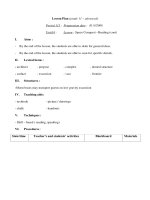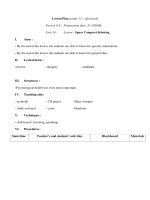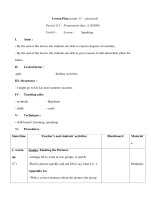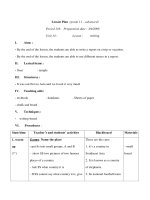Giáo án anh văn lớp 12 - Unit 14: INTERNATIONAL ORGANIZATIONS - READING pdf
Bạn đang xem bản rút gọn của tài liệu. Xem và tải ngay bản đầy đủ của tài liệu tại đây (33.58 KB, 8 trang )
LESSON PLAN
Unit 14 INTERNATIONAL ORGANIZATIONS
SectionA: READING
Aims
To help students gain knowledge of some international organizations and
their roles in the world.
To enable students to read for gist and to scan for specific details.
Method and teaching aids: Integrated, mainly communicative
Pictures of the logos of relevant international
organizations
Procedure:
Teacher’s Activities Students’ Activities
Warm-up (5 mn)
Teacher (T) guides students (Ss) to look
at the logo of the United Nations and
those of some other organizations and
answer the guiding questions.
1. What organizations do these logos
represent?
Students look at the pictures and answer the
questions based on their background
knowledge.
1. The United Nations, the United Nations
Children’s Fund, World Trade
Organization, World Health Organization,
etc.
2. What roles do they play in the world?
2. Their roles are to improve different
aspects of life, i.e., health, education,
children’s condition of living, trade, etc.,
in the world.
Pre-reading (20 mn)
a) T has Ss work in pairs, match the logos
with corresponding names and then
read the names of the organizations
aloud.
b) T has Ss discuss in pairs and find out
the difference in meaning between
‘abbreviation’ and ‘acronym.’
Ss sit in pairs and do the task assigned by T.
Answer
1. D 2. E 3. F 4. A 5. C 6. B
Students work in pairs and do task b).
Answer
acronym: a word formed from the first
letters of the words that make up the
name of something.
Example: World Health Organization =
WHO, pronounced / hu: /
abbreviation: short form of a word
Example: UN, pronounced /ju: ‘en /
1. United Nations: UN (abbr.) /ju: ‘en /
(Lieân Hieäp Quoác)
2. United Nations Children’s Fund:
UNICEF (acr.) /’ju:nisef/ (Quyõ Nhi
đồng Liên Hiệp Quốc)
3. Food and Agriculture Organization: FAO
(abbr.) /,ef ei ‘ou / ( Tổ chức Lương thực
và Nông nghiệp Thế giới)
4. World Health Organization:WHO (acr.)
/hu:/
5. World Trade Organization: WTO(abbr.)
/ ,d blju: ti: ou/ (Tổ chức Thương mại
Thế giới)
6. International Civil Aviation Organization:
ICAO (abbr.) /ai si: ei ou/ ( Tổ chức
Hàng không Dân dụng Quốc tế)
While-reading (45 mn)
a) Find the words in the reading which
mean:
T has Ss work individually, do the task by
looking through the text and find the
meanings of the words in context,
then do the matching task.
Ss work individually, then compare their
answers in pairs.
Answer
1. permanent (par. A)
2. eligible (par. A)
3. promote (par. B)
4. regulations (par. B)
5. mandate (par. D)
6. originate (par. D)
7. regulate (par. F)
b)
T. has Ss work in pairs, read each
paragraph to scan for specific
information, then write the names of the
corresponding international organization.
Students do task b).
Answer
Paragraph A: UN Security Council
Paragraph B: International Civil Aviation
Organization
Paragraph C: United Nations Development
Program
Paragraph D: Food and Agriculture
Organization
Paragraph E: World Health Organization
Paragraph F: World Trade Organization
Ghi chú: UN Security Council = Hội
đồng Bảo an Liên Hiệp Quốc
c)
T. has Ss work in pairs, read the functions
or activities listed in the left column, then
write the corresponding international
organizations in the right column.
Students do task c).
Answer
1. UN Security Council
2. ICAO
3. UNDP 4. WTO
5. FAO 6. WHO
Post-reading (18 mn)
T has Ss sit in groups of four and
discuss what the above mentioned
international organizations have done in
Viet Nam.
Homework: (2 mn)
Ss discuss the roles of the above mentioned
international organizations in Viet Nam.
Grade 12, Intensive LESSON PLAN
Period: Unit 14 INTERNATIONAL ORGANIZATIONS
Date: Section B: Speaking
Aims
- To help students gain knowledge of some international organizations and their roles
in the world.
- To enable students to talk about international organizations
- Report on discussion results
Method and teaching aids: Integrated, mainly communicative
Pictures of the logos of relevant international
organizations
Procedure:
Teacher’s Activities Students’ Activities
Warm up: (5mm)
Use the Photos:
- Makes the questions & ask SS to answer
- lead to the new lesson.
- Look at the photos
- Answer the questions
Pre-speaking: (10 mm)
a. Vocabulary:
- establish (v) - (to) build
Listen
- attainment (n): accomplishment &
achievement
- carry out (v):
- advocate (v): to recomment or support
sth
- endanger (v): to cause danger to sb/sth
b. Checking: ROR
* Discuss the questions (page 155)
1. What does WHO stand for?
2. When was WHO established?
3. What is its major objective?
4. What are its main activitives?
-Repeat
-Copy
-Pair work
-Individuals
Students work in pairs and do task 1).
Answer
1. Who stands for the Woeld Health
Organization.
2. It was established on 7 April 1948
3. Its major objective is the attainment by
all peoples of the highest possible level of
health
4. Its main activitives are carrying out
research on medical development and
improving international health care.
While-speaking: (20 mm)
Task 2:
- Ask SS to ask and answer about the
International organizations.(UNICEF &
WWF)
- Work in pairs & do task 2 (P.156). able
to base on task 1.
Task 3: Tell a partner what you khonw
about one of the above mentioned
international organization. Ues the
information from Task 1 and 2
- Work in groups
- Give feed back
Post-speaking: (8 mm)
Report to the class
-Ask Ss to tell what they discuss
- Report in front of class.
Homework: (2 mm)
Rewrite the international orgainizationas
-Do at home









